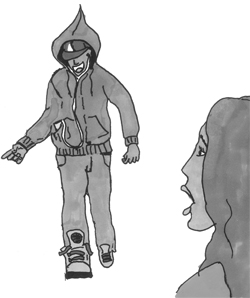When parents are at their wit’s end, they sometimes think child welfare can do a better job controlling their teens than they can. Priti Kataria, director of the ACT Project (Adolescents Confronting Transition) for older youth at Lawyers For Children, cautions parents against voluntarily placing teens in foster care:
director of the ACT Project (Adolescents Confronting Transition) for older youth at Lawyers For Children, cautions parents against voluntarily placing teens in foster care:
Sometimes parents decide to seek help from child welfare when they have seen their teen’s situation get worse and worse. The child is rebelling, testing, staying out late, not going to school. Parents have a lot of anger. They’re exhausted.
At that point, some parents are just done. Some don’t even come to court appearances once the child is placed in foster care. But other parents are clearly hoping that the child will get mental health services and structure through foster care placement. Sometimes they hope that being in foster care will give their child a new appreciation for actually being a part of a family.
Some of these are parents who adopted from foster care and are returning those children to foster care now that they’re teens. Sometimes foster parents are pressured to adopt, or they adopt without understanding how trauma and foster care placement can affect children when they become teens. Then, when that child starts acting out, the adoptive parent places that child back in care.
Hit or Miss
Although some young adults in foster care can thrive because they want and need the support services that foster care can provide, foster care placement often falls far short of its promise to help. Sometimes the behaviors that parents want to “cure” will actually get worse. In group homes or residential treatment centers where most older youth wind up, the level of service and supervision is hit or miss. Very often, young people in care will be surrounded by other youth who are in pain and acting out. There’s gang involvement. There’s theft. There’s running away. That kind of environment can affect a teen’s behavior.
Many agencies don’t have their own mental health staff, either, and rely on local clinics. Teens in care often face the same long waiting lists for mental health services as they would if they were home.
Perhaps most importantly, there’s the trauma to the parent-child relationship. A lot of times teens will say, “If I’m here, why should I even bother trying?” Even if they don’t show it, placement in foster care can make a youth feel abandoned and create a lifelong struggle to regain confidence and acceptance.
Seek Supports at Home
Some teens really do need the support and services that an appropriate placement can provide and some parents who are ill or otherwise struggling simply must turn to the foster care system for help. Some agencies have in-house staff psychiatrists and psychologists, and some smaller therapeutic settings can provide welcome structure and supervision. However, in most cases, the medicine a parent seeks can often be more harmful than the cure they are hoping for.
For more information about accessing supports for families of teens, see “Taking Back Our Teens.”
